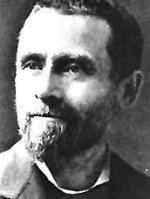John Peter Altgeld

SLEEP softly * * * eagle forgotten * * * under the stone.
Time has its way with you there, and the clay has its own.
"We have buried him now," thought your foes, and in secret rejoiced.
They made a brave show of their mourning, their hatred unvoiced.
They had snarled at you, barked at you, foamed at you, day after day,
Now you were ended. They praised you, * * * and laid you away.
The others that mourned you in silence and terror and truth,
The widow bereft of her pittance, the boy without youth,
The mocked and the scorned and the wounded, the lame and the poor
That should have remembered forever, * * * remember no more.
Where are those lovers of yours, on what name do they call
The lost, that in armies wept over your funeral pall?
They call on the names of a hundred high-valiant ones,
A hundred white eagles have risen, the sons of your sons,
The zeal in their wings is a zeal that your dreaming began
The valor that wore out your soul in the service of man.
Sleep softly, * * * eagle forgotten, * * * under the stone,
Time has its way with you there and the clay has its own.
Sleep on, O brave hearted, O wise man, that kindled the flame—
To live in mankind is far more than to live in a name,
To live in mankind, far, far more * * * than to live in a name.
-- Vachel Lindsay, "The Eagle That is Forgotten," a tribute to John P. Altgeld
The son of immigrant farmers, John Peter Altgeld taught school and held down common laborer jobs while studying law, entering the Bar in 1871. Three years later he was elected state attorney in Illinois and, bolstered by a fortune he made in real estate, ran unsuccessfully for Congress (1884) and U.S. Senate (1885).
In 1884, he wrote Our Penal Machinery and its Victims, in which he criticized the American justice system for being oriented against the poor and encouraging brutality by delivering brutal treatment of prisoners, and he began to express pro-labor stands, although he took no public position on the Haymarket incident in 1886. That year he was elected to the Cook County Superior Court, where he spoke in favor of abolishing sweatshops and child labor, prompting the Chicago Tribune to label Altgeld a "follower of Jefferson -- and Karl Marx."
Nominated for governor by the Democrats in 1892, he campaigned on non-radical issues and won, but soon after courted controversy by issuing a proclamation against the lynching of an African-American in Decatur, Illinois, and, most famously, by pardoning the surviving members of the Haymarket affair (Messrs. Fielden, Neebe and Schwab) with an 18,000-word supporting essay which denounced the uses of capital and government authority against the laborer.
He was criticized around the country as a friend of anarchy, but this only emboldened Altgeld's radical pro-union stance: while President Cleveland tried to break the Pullman strike of 1894 with federal troops and injunctions, Altgeld demanded that Cleveland withdraw the troops, and spoke out against the corrupt control of the White House by the captains of corporate wealth, describing the Cleveland administration as "the slimy offspring of that unhallowed marriage between Standard Oil and Wall Street."
Despite his radical reputation, Altgeld might have won the 1896 Democratic presidential nomination were it not for his foreign birth; instead he supported William Jennings Bryan and ran unsuccessfully for reelection as governor (although he polled better than Bryan did in Illinois). He lost a bid for mayor of Chicago in 1899 and began a law partnership with the famous Clarence Darrow, before succumbing to a cerebral hemmorhage on March 12, 1902.
Categories: American-Politicians, Labor-History





0 Comments:
Post a Comment
Subscribe to Post Comments [Atom]
<< Home